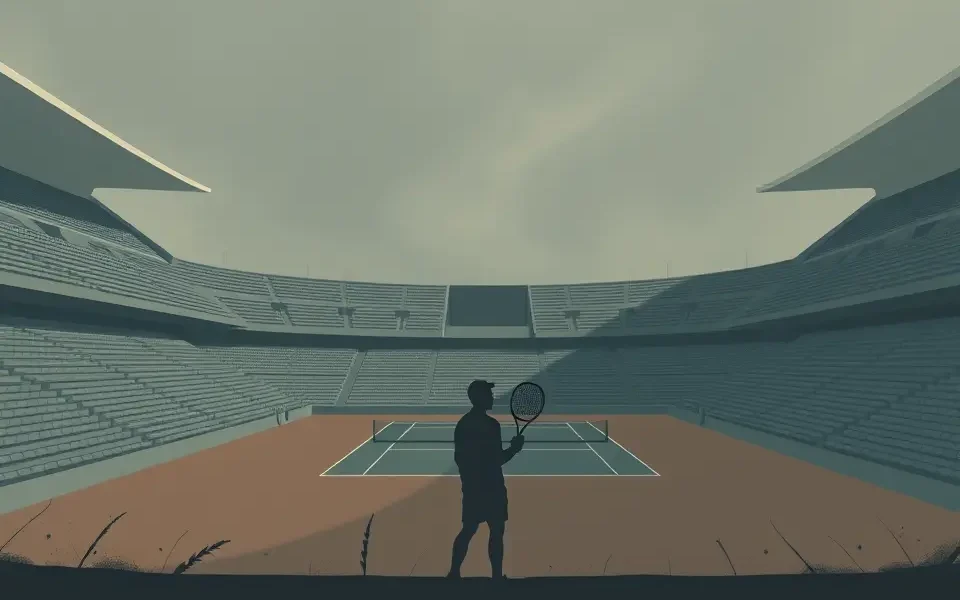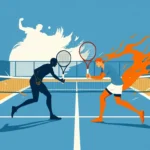Alexander Zverev’s first-round exit at Wimbledon 2025 has sparked discussions about his mental state, with his brother Mischa Zverev’s reaction drawing attention. Following his defeat to Arthur Rinderknech, Alexander “Sascha” Zverev spoke openly about feeling “empty” and lonely, suggesting he might need therapy. However, Mischa Zverev’s initial comments on the matter have been described as “shocking” by some observers.
Alexander Zverev’s Wimbledon Loss and Mental Health Admission
Alexander Zverev, the world No. 3, suffered a surprising defeat in the first round of Wimbledon against Arthur Rinderknech. The match, a grueling five-set battle, ended with a score of 6-7(3), 7-6(8), 3-6, 7-6(5), 4-6. Following the loss, Zverev was candid about his mental struggles during the post-match press conference. He expressed feelings of isolation and a lack of motivation, stating, “I feel very alone out there at times. I struggle. Mentally, I’ve been saying that I’ve struggled since after the Australian Open”. Zverev also mentioned considering seeking therapy, a first for him. “I’ve never felt so empty. I’m missing the fun in everything I do,” he said.
Mischa Zverev’s Response: A “Shocking” Message?
Mischa Zverev, Alexander’s brother and a former professional tennis player, offered his perspective on Alexander’s comments. Speaking to Prime Video, Mischa admitted he was surprised by his brother’s statements. “I don’t know what to make of his comments; I’m hearing them for the first time,” he said.
However, some of Mischa’s remarks have been met with criticism. He stated, “He’s fine. He lost. Of course, you’re sad and disappointed, but that’s part of the issue. But he’s not missing out on anything, unlike in recent years when he sprained his ankle or something like that. It’s sad. It’s a shame he lost”.
According to some sources, Mischa also compared Alexander’s situation to children in Africa, suggesting that others have it worse. This comparison drew negative reactions from fans, with some suggesting that Mischa and other Zverev family members could also benefit from therapy.
Despite the initial shock, Mischa Zverev also expressed support for his brother. “If he’s talking about it, that’s good; usually, I’m just a listener,” he said. He also mentioned that he and Alexander had discussed positive things and future plans after the match, and that he would take his brother’s statements seriously, offering help where he could. “We talked about various things, including positive things, including the match. We talked about things that are fun and that we can do in the coming weeks. But it all seemed positive,” Mischa stated. “I try to listen and then, if I can, help”.
Conflicting Interpretations
While some viewed Mischa’s comments as dismissive and insensitive, others pointed out that he also expressed concern and a willingness to listen and support his brother. It’s important to note that Mischa stated he was hearing these concerns for the first time and that his initial reaction might not fully reflect his true feelings or intentions.
Alexander Zverev’s Recent Struggles
Alexander Zverev’s recent admission of mental health struggles comes after a period of inconsistent performance. While he reached the Australian Open final in 2025, his form has dipped since then. Zverev himself acknowledged that his current issues extend beyond the tennis court. “I don’t think tennis is the problem right now for me,” he said. “It’s something else that I have to find within me at the moment. But something within me has to change, which is not necessarily on the tennis court”.
Career Overview
Despite his recent struggles, Alexander Zverev has had a successful career, with 24 ATP Tour titles in singles and two in doubles. His accomplishments include a gold medal at the 2020 Tokyo Olympics and titles at the 2018 and 2021 ATP Finals. He reached the finals of the French Open in 2024 and the US Open in 2020. Zverev is also the only player to have beaten both Rafael Nadal at Roland Garros and Novak Djokovic at the Australian Open.
Moving Forward
Alexander Zverev’s openness about his mental health is a significant step, and it remains to be seen how he will address these challenges. His brother Mischa has expressed a willingness to listen and help, even if his initial comments were not well-received. As Zverev seeks to regain his form and address his personal struggles, support from his family, team, and potentially a mental coach will likely be crucial.








No Comment! Be the first one.